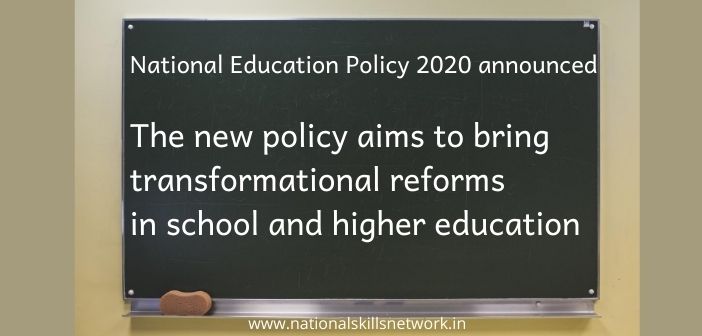National Education Policy 2020* is the result of extensive consultation involving many stakeholders at the grassroots level. This included suggestions from 2.5 Gram Panchayats, 6600 Blocks, 6000 ULBs, 676 District.
Ministry of Human Resource Development is renamed as Ministry of Education
The Union Cabinet chaired by the Prime Minister Shri Narendra Modi today approved the National Education Policy 2020. The new policy aims to pave way for transformational reforms in school and higher education systems in the country. This policy will replace the 34 year old National Policy on Education (NPE),1986.
Highlights of the National Education Policy 2020
How School Education will be transformed through these policy decisions:
- National Policy of Education 2020 (NEP 2020) aims for universalization of education from pre-school to secondary level with 100 % Gross Enrolment Ratio (GER) in school education by 2030.
- Another significant objective of NEP 2020 will make use of open schooling system to bring 2 crore out of school children back into the main stream education.
- The current 10+2 system to be replaced by a new 5+3+3+4 curricular structure corresponding to ages 3-8, 8-11, 11-14, and 14-18 years respectively. This will ensure school education for age groups of 3-6 years under school curriculum, which has been recognized globally as the crucial stage for development of mental faculties of a child. The new system will have 12 years of schooling with three years of Anganwadi/ pre-schooling
Vocationalization of Education
NEP 2020 lays stress on Foundational Literacy and Numeracy with no rigid separation between academic streams, extracurricular, vocational streams in schools ; Vocational Education will start from Class 6 and there will be provision for internships
- The emphasis is on using mother tongue/ regional language to impart curriculum till Grade 5. There will not be any imposition of a language on any student.
- Assessment reforms include 360 degree Holistic Progress Card, tracking Student Progress for achieving Learning Outcomes
A new and comprehensive National Curriculum Framework for Teacher Education, NCFTE 2021, will be formulated by the NCTE in consultation with NCERT.
By 2030, the minimum degree qualification for teaching will be a 4-year integrated B.Ed. degree .
Also read: CBSE to offer vocational skill-based courses from class 6 to 11 – Here’s more: https://nationalskillsnetwork.in/vocational-skill-based-courses-to-be-offered-by-cbse/
How Higher Education will be transformed through these policy decisions:
- NEP 2020 aims to increase Gross Enrolment Ratio (GER) in higher education to 50 % by 2035 by adding 3.5 crore seats in higher education.
The policy envisages broad based, multi-disciplinary, holistic Under Graduate education. This includes
flexible curricula, creative combinations of subjects
integration of vocational education
multiple entry and exit points with appropriate certification.
UG education can be of 3 or 4 years with multiple exit options and appropriate certification within this period.
Academic Bank of Credits to be established to facilitate Transfer of Credits
- Setting up of Multidisciplinary Education and Research Universities (MERUs), at par with IITs, IIMs, as models of best multidisciplinary education of global standards in the country.
- The National Research Foundation will be created as an apex body for fostering a strong research culture and building research capacity across higher education.
Higher Education Commission of India(HECI) will be set up as a single overarching umbrella body the for entire higher education, excluding medical and legal education.
HECI to have four independent verticals – National Higher Education Regulatory Council (NHERC) for regulation, General Education Council (GEC ) for standard setting, Higher Education Grants Council (HEGC) for funding, and National Accreditation Council( NAC) for accreditation.
Public and private higher education institutions will be governed by the same set of norms for regulation, accreditation and academic standards.
- Affiliation of colleges is to be phased out in 15 years and a stage-wise mechanism is to be established for granting graded autonomy to colleges. Over a period of time, it is envisaged that every college would develop into either an Autonomous degree-granting College, or a constituent college of a university.
Others decisions pertaining to educational technology, gender inclusion and multilingualism
- The collaboration between Centre and the States to ensure public investment in Education sector to reach 6% of GDP at the earliest.
- Creation of autonomous body, the National Educational Technology Forum (NETF), to provide a platform for free exchange of ideas on the use of technology to enhance learning, assessment, planning, administration.
- Emphasis on setting up of Gender Inclusion Fund, Special Education Zones for disadvantaged regions and groups
- Promotion of multilingualism in both schools and higher education; proposed setting up of National Institute for Pali, Persian and Prakrit , Indian Institute of Translation and Interpretation
*This article is based on a press release from PIB.






Comments 3